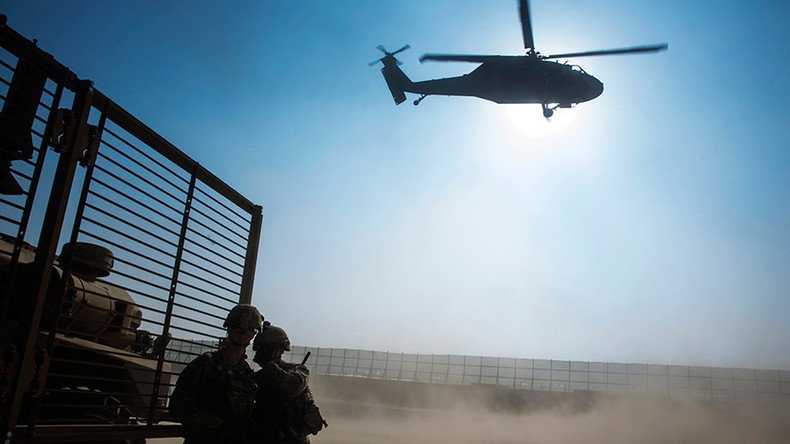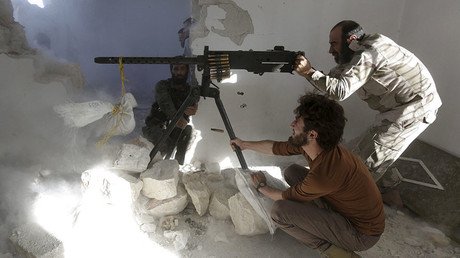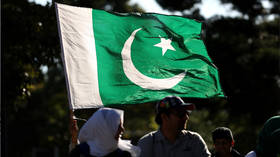‘Confused and contradictory US policy on Syria reaching point of bizarre’

The Obama administration is trying to keep the Syrian war simmering, hoping that Clinton will take office in 2017, said Jim Jatras, former US diplomat. She’ll want to dig in with both feet in support of so-called ‘moderates’ against Assad, he added.
A small group of US Special Forces reportedly fled from the Syrian town of al-Rai near the Turkish border after being threatened by rebel fighters. The Free Syrian Army (FSA), which is considered to be American allies, kicked the US military out, calling them “infidels” and “crusaders.”
RT asked Jim Jatras, former US diplomat, whether it is possible that this incident with Syrian rebels threatening American soldiers could be a turning point in the country’s conflict.
“If you had rational people making rational policy – perhaps. But there is no evidence of that so far,” he said. “The Obama administration’s policy up to this point has been totally confused and contradictory, and now it is just reaching the point of bizarre.”
“We have US Special Operations personnel accompanying the Turks – let’s call them ally Number 1 - in their incursion into Syria. We know that the primary target is not ISIS/ISIL/DAESH for the Turks, it’s the Kurds, who are also American allies – let’s call that ally Number 2. Now we have so-called ally Number 3 – the Free Syrian Army elements threatening these Americans, who are operating with ally Number 1, that they are going to slaughter them. They don’t want the Americans and Christians here. [The subgroup] that did this supposedly is Ahrar al-Sham, which is a really nasty piece of work. It is as Wahhabist, as radical, as violent as Al-Nusra [Front,] or ISIS. But I guess they are part of the moderates here… If you’re going to put it in a work of fiction, it would not be deemed to be plausible to the reader,” Jatras said.
He added that he hopes that these latest developments in the region could influence “the minds of some policymakers to say: ‘Look, we have to hit the reset button and rethink this.’”
US-backed FSA kicks out American special forces troops from Syrian border town https://t.co/TvrTafAZiRpic.twitter.com/dWKnu2F5vn
— RT (@RT_com) September 16, 2016
In his view, though, it’s unlikely to happen under the Obama administration.
“The Obama administration shows all signs of trying to keep the Syrian war simmering until they hope Hillary Clinton can take office in January 2017. And, of course, she’ll want to dig in with both feet in support of these so-called moderates against the Assad government. I just don’t see any signs in reappraisal here,” Jatras added.
Joshua Landis from the Center for Middle East Studies at the University of Oklahoma argues that it’s the US support for the Kurds that could have triggered the US-backed rebels to push American soldiers out of their positions.
“Many of these Arab fighters see the Kurds as enemies who are fighting over the same national territory,” he said.
“There has been a widespread sense that the US is in a war against Sunni Islam; that it has signed the agreement with Iran; that it overthrew Saddam Hussein,” he continued.
Landis said that many people pointed to the fact that Guantanamo was a prison for Sunni Muslims, “and they believe that the US is sided with [Bashar] Assad in Aleppo and in a larger fight against Sunni Muslims in Iraq and today in Syria.”
“Even the fight against ISIS many of them see as the war against Islam; America should be fighting against the [Shiites] and Assad’s government, they should not be fighting against Sunnis,” he said, adding that it’s a widespread belief.
According to Landis, the US is trying to focus very narrowly on destroying ISIS “and not on bringing down Assad.”
In his view, one of the reasons for that is because Washington is worried that “some of these militias, and particularly Al-Qaeda, which is embedded among these militias, could take over were Assad to be overthrown and then they would have the much bigger problem of anti-Americanism.”
“We know from various documentaries that the schools in Idlib and the other areas, where the rebels predominate and where Al-Qaeda is very strong, are teaching to young people to lionize [Osama] bin Laden, the blowing up of the World Trade Center, and the fight against America. So this is part of what is going on in rebel-controlled Syria – not all militias, but perhaps more than America really thinks,” he told RT.
Kurds put trust in US and were abandoned
Meanwhile, Ruptly video news agency has obtained footage apparently showing an American flag flying over a Kurdish position in Tal Abyad, a Syrian town on the border with Turkey.
There have also been reports that US flags are being flown in the town held by the Kurdish YPG, allegedly as a warning from America to Turkey not to attack the Kurds.
Larry Johnson, retired CIA and State Department official, says “most likely” those flags were raised by the Kurds “because they’ve recognized that they are being abandoned in the field of diplomacy.”
'US-backed Syrian opposition using ceasefire to regroup and retake #Aleppo' (Op-Edge) https://t.co/tcaE6qAPPl
— RT (@RT_com) 16 сентября 2016 г.
“They’ve put their trust on the US. Clearly, the government of Iraq, the government of Turkey, and the government of Iran, and the government of Syria have no interest in pursuing or protecting their sovereign rights. They’ve put their money on the US, and as we’ve seen over the last couple of months… given the right political circumstances, the US would sell them down the river, sell them out, not back them up, and abandon them. I think they are calculating that if they raise this flag, it would potentially give Turkey, in particular, pause in launching any kind of airstrikes,” Johnson said.
The statements, views and opinions expressed in this column are solely those of the author and do not necessarily represent those of RT.













